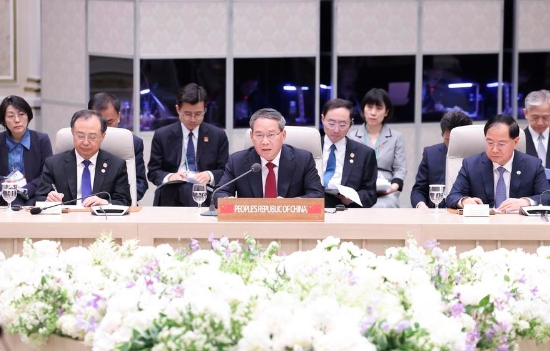Trilateral summit witnesses China-Japan-S. Korea joint efforts to revitalize cooperation

Chinese Premier Li Qiang attends the ninth Trilateral Summit Meeting among China, Japan and South Korea together with South Korean President Yoon Suk-yeol and Japanese Prime Minister Fumio Kishida in Seoul, South Korea, May 27, 2024. (Xinhua/Pang Xinglei)
Chinese Premier Li Qiang, South Korean President Yoon Suk-yeol and Japanese Prime Minister Fumio Kishida had in-depth exchanges at the ninth trilateral summit meeting and the eighth trilateral business summit among the three countries in Seoul. The trilateral meeting, stalled for more than four years due to the pandemic and geopolitical interferences, yielded abundant results on deepening cooperation in various fields.
China, Japan and South Korea on Monday cemented trilateral cooperation and reiterated that amity and mutual trust should be the key tone of the trio's relations to benefit themselves as well as peace and prosperity of the region and beyond.
Chinese Premier Li Qiang, South Korean President Yoon Suk-yeol and Japanese Prime Minister Fumio Kishida had in-depth exchanges at the ninth trilateral summit meeting and the eighth trilateral business summit among the three countries in Seoul.
The trilateral meeting, stalled for more than four years due to the pandemic and geopolitical interferences, yielded abundant results on deepening cooperation in various fields.
Major tangible outcomes include the issuance of the Joint Declaration of the Ninth China-Japan-ROK Trilateral Summit, the Joint Statement on a 10-Year Vision for Trilateral IP Cooperation, and the Joint Statement on Future Pandemic Prevention, Preparedness and Response, among others.
The trio also agreed to deliver on the Trilateral Cooperation Vision for the Next Decade adopted at the eighth trilateral summit in China's southwestern city of Chengdu in December 2019.
A keynote of this year's trilateral gathering is the three parties' commitment to harmonious coexistence and mutual support based on good neighborliness and close partnership, as this year marks the 25th anniversary of the China-Japan-South Korea trilateral cooperation mechanism.
External disruption should not stand in the way of trilateral cooperation or overshadow solidarity among the three Asian neighbors.
Notably, leaders of the three countries refocused on economic integration as the ballast of their cooperation.
They vowed to strengthen trade connectivity, maintain stable and smooth industrial and supply chains, and resume the negotiations of the China-Japan-South Korea free trade agreement as soon as possible.
The leaders reaffirmed endeavors to foster a free, open, fair, non-discriminatory, transparent, inclusive, and predictable trade and investment environment.
Chey Tae-won, chairman of the Korea Chamber of Commerce and Industry, said the summit meeting marks a significant milestone as the three economies have recovered from the pandemic and are now on a growth trajectory.
Ren Hongbin, head of the China Council for the Promotion of International Trade, stressed the importance of improving the investment environment, stabilizing supply chains and advancing industrial cooperation.
These efforts are expected to boost trade and sales, which will further solidify the region's economic resilience and unleash growth potential, Ren said.
As Asian manufacturing powerhouses, the three countries also aim for stronger technological cooperation. Echoing the countries' decision to enhance collaboration in this domain, business leaders from the trio also pledged to jointly drive digital transformation at the business summit.
Recognizing the cultivation of cutting-edge industries and industrial digital cooperation as key engines for economic growth, the trilateral commitment aims to foster a robust regional economy, said Ren.
In addition to economic and trade as well as scientific and technological cooperation, the three leaders hoped that the three countries will take this summit as a new starting point to maintain the stability and continuity of cooperation and deepen cooperation in six key areas: culture and people-to-people exchanges, sustainable development, economy and trade, public health, science and technology, and disaster relief.
Cultural exchanges, for example, are gaining fresh momentum for development to foster mutual understanding and trust.
Monday's meeting witnessed the designation of 2025-2026 as the China-Japan-South Korea Year of Cultural Exchange. The three sides also vowed to increase the number of people-to-people exchanges among the three countries to 40 million by 2030 through promoting exchange including culture, tourism and education.
To chart a sustainable future, the countries reiterated their commitment to carbon neutrality and proposed tangible ways to protect the environment, such as collaborating with Mongolia on reducing dust and sandstorms in East Asia, and promoting collaboration on marine environmental conservation. Managing the aging society is also on their list of expertise sharing.
The three major countries in Northeast Asia play a pivotal role in maintaining regional peace and stability. In the joint declaration of the trilateral summit, the three parties agreed to continue to make positive efforts for the political settlement of the Korean Peninsula issue. They also highlighted efforts to expand cooperation within ASEAN and other multilateral frameworks.
Commenting on the three countries' declaration of striving to institutionalize trilateral cooperation, Liu Qing, vice president of the China Institute of International Studies, said that by committing to regular dialogue and collaboration, the trio can address common challenges and leverage their collective strengths for mutual benefit.
"The renewed focus on cooperation sets a hopeful tone for the future, where Asia can become a cornerstone of peace and development in the global arena," Liu said.
Editor:伏娅敏
